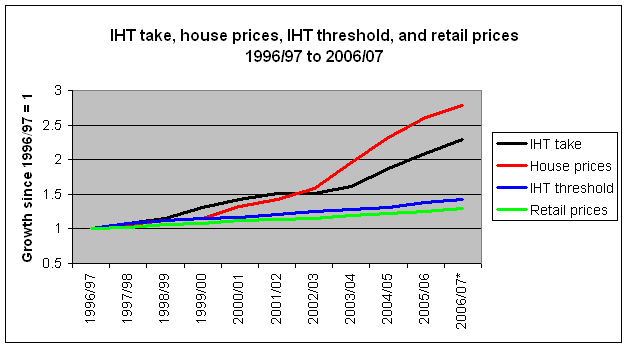
Saga reader Chris Wilson has done some number crunching. He says he is just 7p a week better off now than he was in 1996 when he first got his state pension. Over those ten years his pension has gone up from £66 a week to £91. But almost the whole of that £25 a week rise has been swallowed up by increases in council tax, water, electricity and gas. Leaving him with just 7p a week to cover what he calls "holidays and riotous living". He is joking of course. In fact Chris says "the figures don’t include car costs, home maintenance and suchlike so there has been in fact a steady decline in my income. I must confess I am no end narked when I compare this with the grossly inflated salaries and gilt-edged pensions of MPs."
Chris’s personal experience confirms new figures produced by AllianceTrust. It says that prices are rising more rapidly for pensioners than for younger people and that inflation is worst for the over-75s. The reason is simple. In older households spending is dominated by necessities such as food and drink, housing, and utility bills – the gas, electricity and water identified by Chris. These items are rising in cost more rapidly than the clothing, electronic items, and sports goods which dominate the spending of younger people. But the retail prices index the Government produces looks at a typical ‘basket of goods’ bought by one ‘average household’ which includes many of the things which are falling in price. The result, says AllianceTrust, is that inflation for older folk is half as much again as it is for people under pension age. That would mean that instead of prices rising by 2.4% they are in fact rising for older people by 3.6%. In April the state pension went up by 2.7%. Short changed again.
And Chris Wilson? Now he is 75 he says he will at least get a free TV licence. One snag. He has not had a television since 1972.
Death to taxes
Scrap Inheritance Tax. That was the extraordinary demand over the summer
from ex-Labour Minister Stephen Byers. The strong supporter of Tony Blair claims
that Inheritance Tax was intended to penalise the "landed gentry or the very
wealthy" but now a "growing category of homeowners…are being hit hardest." And
he concluded "Its abolition…would reflect the modern world in which we live."

Sources: IHT take and threshold – HM Revenue & Customs; House prices – Halifax; Retail prices – National Statistics
Byers’s call came in the week it emerged that Inheritance Tax now rakes in twice as much as when Labour came to power. This year it will raise £3.6 billion – more than double the £1.7 billion raised in 1997/98.
The reason for the rise is simple. House prices have soared while the threshold for paying Inheritance Tax has been raised only slightly more than overall price inflation. The result is that millions of homeowners find that the value of their home is enough by itself to mean that their heirs will face a hefty Inheritance Tax bill. In London the average house price is now £280,000 – just a few thousand pounds below the current IHT threshold of £285,000. If the starting point for the tax had risen in line with house prices the threshold would now be more than £450,000, more than double the average price of home.
The Government is unlikely to heed Mr Byers’ call. Gordon Brown has already announced the level of the Inheritance Tax threshold for the next few years. It will rise to £300,000 in April, £312,000 in 2008 and £325,000 in 2009/10. Even if he did scrap this unpopular tax he would have to raise the money elsewhere – and that could mean another penny on the basic rate of income tax.
Lots set to stun
Forty years ago a smart, well written, politically astute science fiction
series hit British television screens. Star Trek boldly went where no soap opera
had gone before – outer space. No-one had seen anything like it before. Five
different series, set in different times, were broadcast and ten feature films
made – another is promised for 2008. To mark the 40th anniversary of
that ground-breaking first episode transmitted on 9 August 1966, Christie’s in
New York is selling every Trekkie’s dream – 4000 items of original costumes,
props, and models from Paramount and CBS studios which were used to make the TV
programmes and films.
 |
 |
 |
You can buy anything from a Klingon cloaking device ($300-$500) to Jean Luc Picard’s Starfleet jumpsuit ($8000 to $12,000). There is even a replica of the full bridge of the Enterprise from the first TV series ($20,000 to $30,000) and a tri-corder - non-functional – for an estimated $500-$700. But prices could go into warp drive. Keen bidding is expected from Trekkies shouting ‘make it so’ and ‘engage’.
The two volume catalogue is £56 (or £312 for a limited edition in a box) and the sale is 5-7 October. More at www.christies.com/startrek
Bogus bonuses
The latest information from National Statistics says that the bonuses
enjoyed by a favoured few in City dealing rooms and on the boards of our top
companies rose by £2.5 billion in 2005 to reach a record £19 billion. That means
as much money goes to a few thousand favoured individuals as we spend on housing
and the environment. Put another way, it is almost as much as is raised by
council tax.
It is hard not be a little envious of these astonishing amounts of money. Now, research by accountants PricewaterhouseCoopers (PwC) shows that the huge rewards paid to top executives do not necessarily mean that they work well for their company, or improve the rewards to their shareholders. In other words, paying bosses shed loads of money is not necessary.
The PwC research shows that barely a quarter of the rewards for chief executives comes in the form of ‘pay’. Another quarter comes as a cash ‘bonus’ and a similar amount is paid by way of shares. The final quarter is divided between pension and various perks such as health care or cars. That takes the total reward package paid to directors of the biggest 100 companies to around £1.2 million a year – and chief executives get around twice that. Annual rewards of this size are very attractive - but not very effective. Tim Gosling of PwC says executive bonuses "are often not hugely successful at aligning executives’ pay with how well they perform…over a sustained period" and he says that some bonus schemes are so complex that they "are not effective in encouraging executives to perform better." In other words, much of it could be money down the drain.
Despite this, there is no sign of the pay declining. While the rest of the working population saw pay rise by around 4% in 2005, directors saw their total reward package rise by around 12%. One reason for this pay creep among top executives is that two out of three of the top companies are advised by just two remuneration consultants. Some large shareholders accuse them of bidding up pay, advising their clients that their directors’ remuneration should be in the top quarter of the pay league. That leapfrog effect leads to the endless rise in executive pay, even when companies do not perform that well.
Jobs go south
The number of people working beyond state pension age is growing rapidly –
up by nearly 100,000 over the last year to reach a record 1,154,000. Most of
these – 760,000 – are women. The new figures mean that nearly one in nine
pensioners is in fact still at work.
But new research shows that this number is far less than it should be. Although an extra 1.5 million people over 50 are now in work compared with ten years ago, another million would like to be. Research by Age Positive – a Government agency supporting older people at work – found that many employers are still discriminating against people over 50 despite the new laws which are aimed to prevent age discrimination at work. Age Positive also produced a league table of the best and worst places for older people to find a job. Slough and West Berkshire are best, along with the London Borough of Merton where more than seven out of ten over 50s are in work. But in Liverpool, Hartlepool, Knowsley, and the London Borough of Hackney the proportion is less than four out of ten. So moving south can help your job prospects as long as you pick the right London Borough.
October 2006